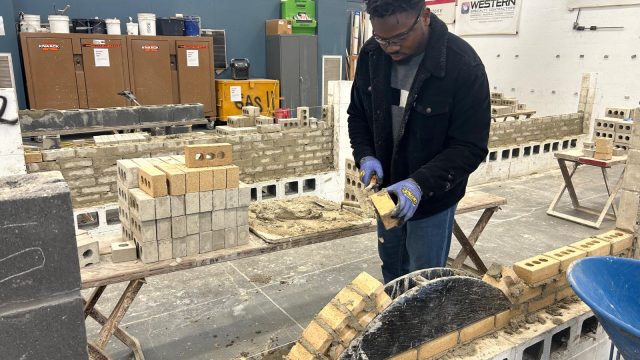A Nigerian civil engineer and researcher, Daniel Akerele, has developed a groundbreaking concrete technology that could slash road and bridge repair timelines in Nigeria from several months to just a few days, potentially saving the country billions of naira and easing traffic congestion in major cities like Lagos.
Akerele, a PhD candidate in construction management at the University of Washington, United States, is pioneering the use of low-carbon, rapid-set concrete technologies specifically designed for fast, durable, and environmentally sustainable infrastructure rehabilitation.
In an interview, Akerele said his research focuses on Alternative low carbon concreting with special interest in Calcium Sulfoaluminate (CSA) systems, a fast-setting, low-emission alternative to the traditional Ordinary Portland Cement (OPC) that currently dominates Nigeria’s construction industry.
CSA cement reaches compressive strengths of over 3,200 psi within just four hours, a performance level that allows for critical infrastructure like highways, airport runways, and bridge decks to be repaired in under a week.
“There’s no reason why critical infrastructure like the Third Mainland Bridge should be closed for months. With the right materials and strategies, full repairs can be done in less than a week,” Akerele told our correspondent.
Nigeria’s infrastructure, particularly in urban centres such as Lagos, has suffered from chronic neglect, slow-paced rehabilitation works, and traffic paralysis due to prolonged closures for maintenance.
The Third Mainland Bridge, Africa’s second-longest, has undergone multiple shutdowns over the years for structural repairs, often lasting months and triggering massive traffic gridlock across Lagos.
Akerele believes this can change drastically with the adoption of CSA-based technologies, which offer both rapid deployment and environmental advantages.
According to him, CSA cement production emits 30 to 45 per cent less CO₂ than OPC and requires lower energy during manufacturing.
It also shows enhanced durability, better resistance to chloride penetration, reduced thermal strain, and lower drying shrinkage, which are critical factors in ensuring the long-term performance of repaired infrastructure.
“The science is here — low-carbon, rapid solutions ready for deployment. Collaboration between government, industry, and academia is key to building resilient futures,” Akerele said.
His work also integrates artificial intelligence (AI) and life-cycle assessment (LCA) modelling to predict material behaviour, optimise mix designs for different climatic conditions, and reduce environmental impact.
These advanced techniques make it possible to tailor concrete mixes for specific Nigerian environments, such as coastal cities prone to saltwater corrosion or the arid north susceptible to thermal cracking.
Akerele is no stranger to Nigeria’s construction challenges.
As a COREN-licensed civil engineer, he began his career as a project coordinator at Sparklight Engineering Ltd., overseeing site infrastructure at the Dangote Refinery complex in Lagos.
He later served as Construction and Design Manager at Sustainable Procurement Services Ltd., where he managed environmentally compliant projects across the country.
His academic journey started with a B.Tech in Civil Engineering from Ladoke Akintola University of Technology and an MSc in Civil Engineering from the University of Ibadan, where his thesis focused on borehole water quality in the Lekki area of Lagos.
His study exposed widespread contamination in borehole water and proposed cost-effective treatment methods, including hypochlorite disinfection and multi-stage filtration.
Currently based at the University of Washington’s Centre for Education and Research in Construction (CERC), Akerele leads experimental research in low-carbon concrete and mentors graduate students in sustainable construction.
He is also a recipient of several prestigious academic fellowships and awards, including the UW College of Built Environment’s Top Scholar Award, the ACI Foundation Fellowship, and the Clean Energy Institute Graduate Fellowship.
His peer-reviewed publications, such as “Effectiveness of Rapid-Set CSA Concrete Mixes for Sustainable Pavement Repair” and “Evaluating the Impact of CO₂ on Calcium Sulfoaluminate Concrete,” provide empirical backing for the real-world application of CSA cement.
He has also conducted extensive research on Portland Limestone Cement (PLC), another sustainable alternative, which he found to perform comparably to OPC in many durability parameters, especially resistance to chloride ingress and freeze-thaw cycles.
Akerele, however, noted that PLC can be prone to early-age cracking in colder climates, underscoring the importance of climate-specific mix design.
To facilitate large-scale adoption of these innovative materials in Nigeria, he is currently working with industry players to develop a national implementation roadmap.
In a recent webinar hosted by Fincrete Global, he advocated for the rollout of Limestone Calcined Clay Cement (LC3), another low-carbon option, and called for the establishment of a tripartite partnership between the Nigerian government, academic institutions, and private sector actors.
Akerele emphasised that while the scientific and technological tools are readily available, political will and coordinated policy action are urgently needed to transition Nigeria’s infrastructure sector from its current state of decay to a model of sustainability and efficiency.
“Our bridges, roads, and airports don’t have to remain stuck in a cycle of decay and endless repairs. With the right materials, skills, and commitment, we can deliver infrastructure that not only lasts but is also built faster and with less harm to the planet,” he said.
As Nigeria continues to grapple with the dual crises of infrastructure collapse and environmental degradation, Akerele’s research offers a practical, science-driven pathway to building climate-resilient and future-ready infrastructure.







